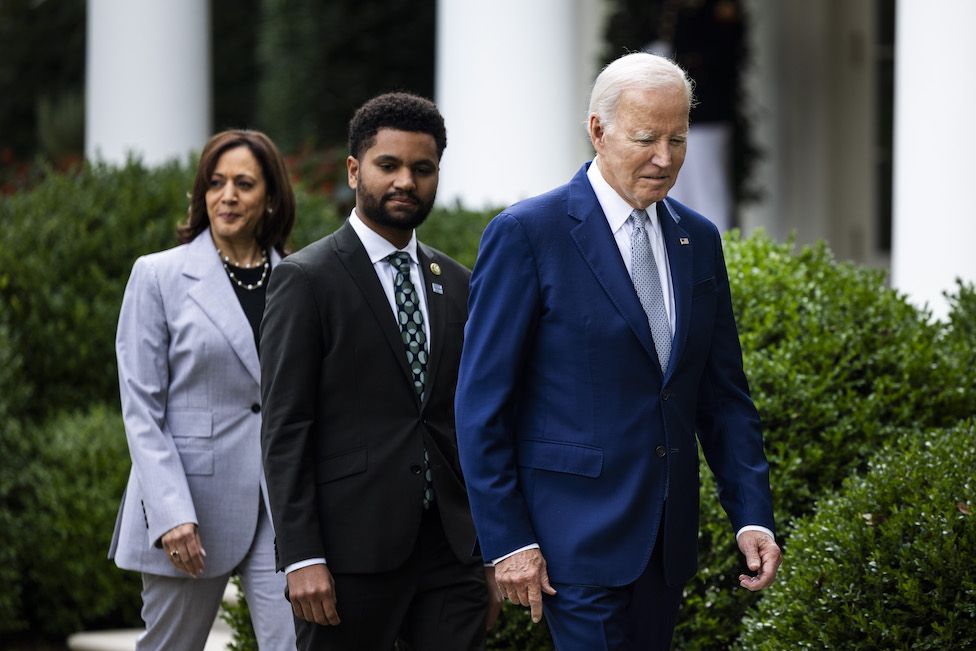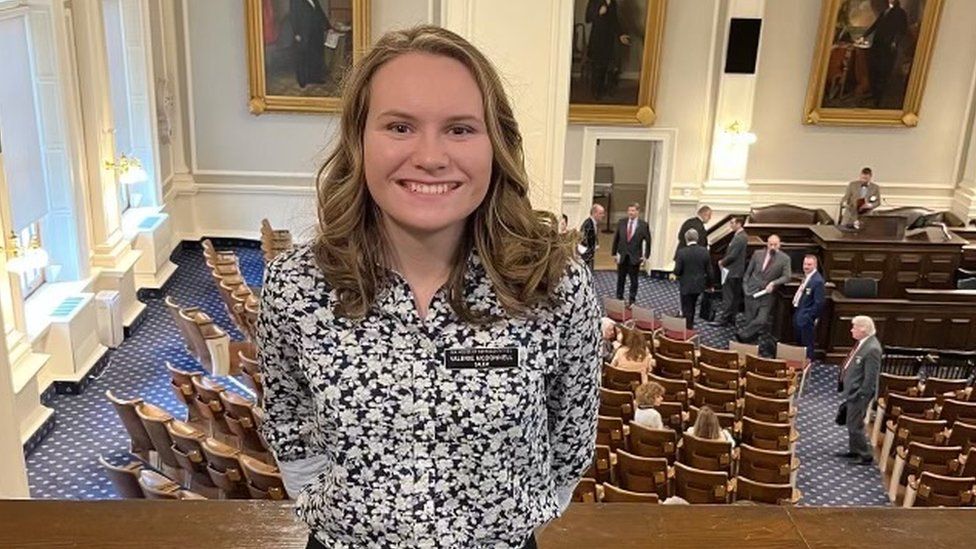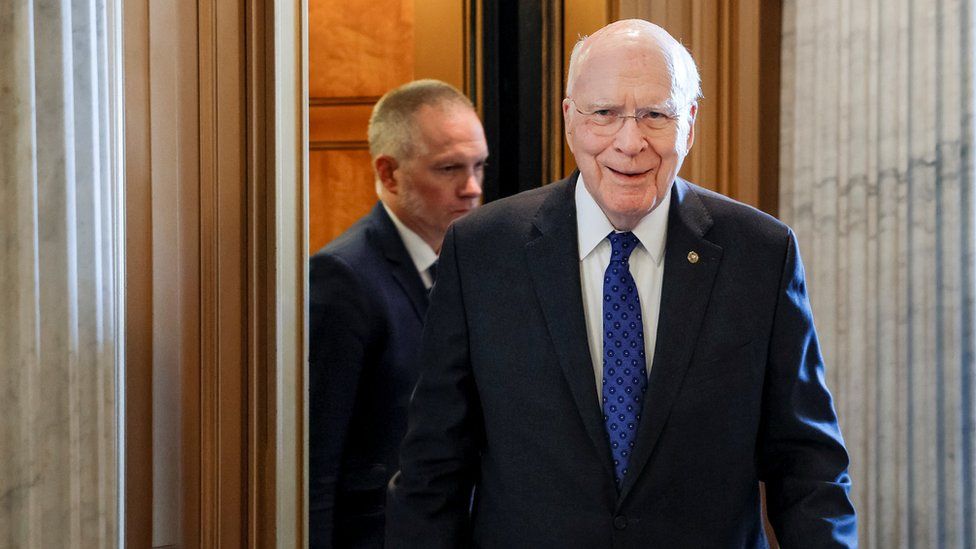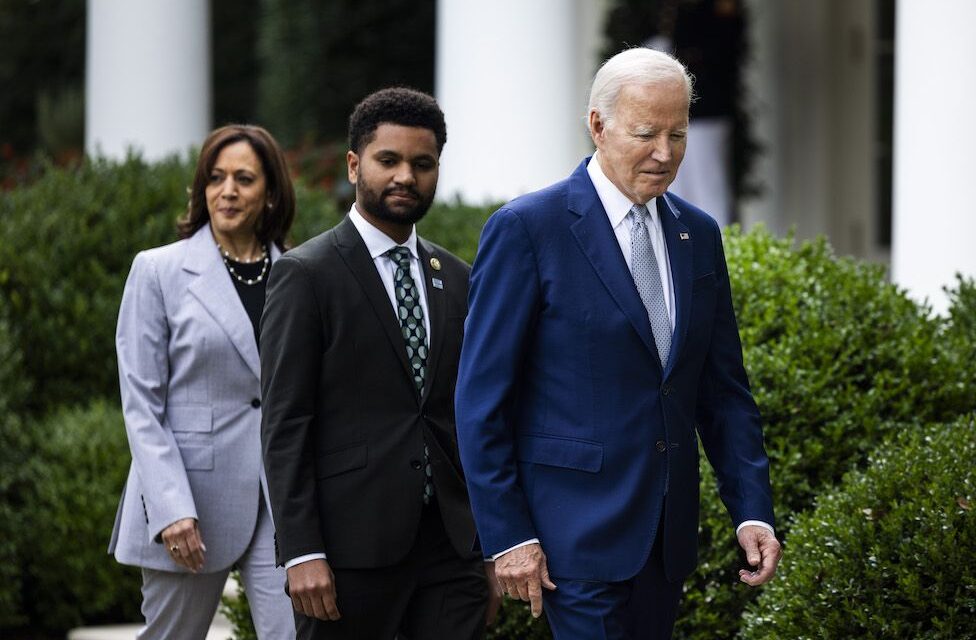This video can not be played
To play this video you need to enable JavaScript in your browser.
Once an obscure word, “gerontocracy,” which means a government ruled by people who are significantly older than the adult population, is now increasingly part of Americans’ vocabulary.
Not a lot unites Democrat and Republican voters but one issue stands out: many think America’s leaders are too old.
Much has been said about the ages of President Biden and his likely contender Donald Trump. Mr Biden turns 81 on Monday, making him the oldest president ever, with Mr Trump no spring chicken at 77.
But they are not even the oldest. Democrat Nancy Pelosi says she will seek House re-election next year, aged 83. And Republican Chuck Grassley is the United States’ oldest sitting Senator at age 90.
Derived from the Latin word senex, which means ‘old and ‘old man’, the Senate has always been home to some of the country’s most elder statesmen and women. However, with a median age of 65, today’s Senate is now the oldest it has ever been, according to Professor Kevin Munger and author of Generation Gap: Why the Baby Boomers Still Dominate American Politics and Culture.
“We expect people to be in their 50s and 60s – it’s perfectly reasonable to have people with that experience running the country,” he told the BBC. “But we’re talking about it now because we have people who are in their 80s and running the country and that is unique.”
Mr Munger said the reasons for this current aging leadership varies. Many are unable to let go of being in power, which in turn is enabled by no term limits. The baby boom (those born from 1946 to 1964) also meant that a large cohort of elected officials has approached retirement age.
“We are simply seeing the decades downstream consequence of that, amplified by specific historical events and American political institutions,” he said.
With so few leaving office, opportunities for young people to join the ranks are rare. Those that have broken through the so-called grey wall say they can often be underestimated because of their age.
Florida Democratic Congressman Maxwell Frost, became the youngest member of Congress – and its first Gen-Z member – when he was elected this year at the age of 25.
“I remember when I first came to Congress and I was going to the member entrance and I had to show my card,” he told the BBC. “And the security guy called over some of his friends and was like how old are you? And you’re black too?”
“They’re right! I don’t look like a member of Congress.”

While being young gives him a perspective into a generation his elderly colleagues cannot share, he points out that not all young Americans are the same.
“I don’t believe I am the sole representative of Gen Z,” he said. “There’s many young people who would say I don’t represent everything they believe. It’s not enough to just have young people in these halls.”
Case in point: President Biden. Mr Frost applauded him for making issues, like student loans, a priority.
“Not everything is about age.”
Still, many are calling on the older generation to step down to make room for faces like Mr Frost’s.
Democratic Senator Dianne Feinstein, who died earlier this year aged 90, had faced many calls to resign following long-running concerns about her health.
The same worries are now being raised about 81-year-old Republican Senate Minority leader Mitch McConnell. He twice froze for an uncomfortably long time during two press conferences, prompting questions about his health.
A Pew Research study found 79% of Americans want age limits for federal officials and generational change.
Some younger people have found success at a local level. New Hampshire has a small population but the largest state legislative body in the country, and Valerie McDonnell, a Republican, was elected at aged 18, making her the country’s youngest state legislator.
The college student said she doesn’t want her age to be a focus, but she does see it as an asset.
“If we have people that are ages 18 to 25 in this country who are least likely to vote, I think a lot of that is because they don’t see themselves represented,” she told the BBC. “So now I have had some of my classmates who registered to vote, and very kindly cast their first vote for me.”
Ms McDonnell, now 19, said being a teenager can make a difference, for example when recently discussing a bill about social media.
“I serve on a 20-member education committee. And I really feel that my committee valued my opinion, being someone who could give that first-hand contemporary account of what it is like, as a student networking and using social platforms to advance their careers.”

She serves alongside her friend and colleague Republican Joe Alexander, 28, who was first elected to the state legislature five years ago.
“I think I was 10 years old and my mom took me into a voting booth. She said, this is one of the most important things you can ever do: make your voice heard and vote. That’s how I got interested in politics,” he said, showing his We The People tattoo on his upper arm.
Mr Alexander said he was spurred to seek office by the cost of housing. Polls suggest it’s the number-one issue in New Hampshire.
Both Mr Alexander and Ms McDonnell have been supported by Run GenZ, an organisation aimed at helping to mould the next generation of conservative leaders. Its executive director, 28-year-old Mason Morgan from Texas, said some assume if you’re young, you don’t have the experience needed to do the job.
“I always get a little more excited, when I get to talk to somebody who started their own business at 16, and they’ve not done the traditional four-year education,” he said. “Those kinds of folks bring a different perspective.”
Being a state representative isn’t lucrative at all – the salary is $100 a year in New Hampshire. When they’re not serving in their local district, Ms McConnell works at a grocery store, and Mr Alexander is a part-time barman. Kevin Munger, the political-science professor, said lack of funds can make it harder for the younger generation to run.
“Older people have a lot more money, especially those who are in their 70s and 80s,” he said.
But Mr Alexander said it’s down to individuals when they want to retire, and that ‘it’s not just about age, but a person’s mental dynamic.’ He thinks there is room for young and old in politics.
“It’s important that we value the generation that has brought a lot to the table, and it’s put us where we are. My goal as a representative that’s younger, is to partner with that generation. They’re allies in the fight.”

There are signs that the grey wall is crumbling, and the old guard might be ready to step aside to make way for the new.
Democratic Senator Joe Manchin and Republican Senator Mitt Romney, both 76, said they won’t seek re-election.
Patrick Leahy, once third in line to the presidency, retired from the Senate earlier this year, before he turned 83. The Democrat said more should follow suit.
“I’ve seen many who should have left Congress and didn’t. Some died in office. I did not want to be in that category,” he said from his home in Vermont, where he is now based.
When he left, he was the longest serving member of Congress.
Senator (they keep that title for life) Leahy said he did all he could while in office, and witnessed historic moments that were “harrowing and inspiring”, but it was time to leave, especially following his hip surgery. Still, many of his former colleagues are hanging onto their posts.
“They have no other life to be honest. There are some who want the grandeur of it.”
Is Senator Leahy tempted to get back into the ring? Like his friend Nancy Pelosi?
‘No!’ he shouted, and then smiled. While he’s still involved in some local politics, he is happy teaching at his local university and spending time with his wife, children and grandkids.
“I’m in my 80s. It is time for somebody else.”





